Join the Billion Byte March
-- CTF Urges Canadians to Join the "Billion Byte March for Tax Cuts" --
What Canadians Say
Bracket Creep
Ottawa's Tax Record
CTF Recommends
OTTAWA: The Canadian Taxpayers Federation (CTF) today called for over $9 billion in various tax relief measures to be implemented in the Millennium budget expected to be tabled by Finance Minister Paul Martin next February.
"Getting rid of the stealth tax known as bracket creep has to be priority number one for the Finance Minister," said CTF federal director flanked by 9,418 shiny, new loonies to illustrate the extra taxes that have been paid by the average $40,000 wage earner over the last decade. "This government continues to rely more on personal income taxes and has hiked them every year through bracket creep since they were elected in 1993. "
To bring taxpayer pressure to bear on the government CTF spokespersons will fan out on an aggressive national speaking tour this fall in addition to a billboard, print campaign and national petition campaign.
The CTF will utilize its award winning website (www.taxpayer.com) to launch the "Billion Byte March for Tax Cuts" where taxpayers can conveniently fill out the petition on-line that will be forwarded to the Finance Minister before he delivers Canada's Millennium budget.
In summary, the CTF recommended over $8.91 billion in specific tax relief measures that include:
Re-indexing the tax system to inflation (Tax cut impact: $1.2 billion)
Elimination of the 5% federal surtax (Tax cut impact: $650 million)
A 10% across-the-board income tax cut by lowering the 17%, 26% and 29% federal tax brackets to 15%, 24% and 27% respectively (Tax cut impact: $7.06 billion).
"By substantially reducing the tax burden the federal government would send a strong signal to Canadians that the new millennium belongs to Canadian families and taxpayers," concluded Robinson. "Meaningful tax relief is 2000 years overdue."
-- 30 --
For more information contact:
Walter Robinson at 613-234-6554 or (1-800-265-0442)
What Canadians Say
April 1999
A National Post/Compas poll finds that "across Canada, 85% of respondents said they are at least somewhat upset with the level of taxation. About half of those who report being upset with tax rates are extremely or very upset.
Between 96% and 98% of people in each of the provinces believe that controlling taxes, spending, and debt is extremely, very, or somewhat important. Fewer than 4% of Canadians said the issue is not really important or not at all important.
June 1999
A ,Reader's Digest/Gallup poll found that "there is a strong consensus on the issue of tax fairness. When asked to name the highest total tax a family of four should pay, respondents across economic ethnic, ideological and age lines answer with surprising uniformity: 29%."
Another crucial finding is Canadians' extraordinary personal unhappiness with the amount they themselves pay in taxes. An astounding 83 percent of respondents feel their own tax payments are too high.
September 1999
Southam News reports that a survey by the Liberal party's own pollster, "POLLARA Inc. of Toronto, shows the widespread impression among Canadians that they cannot keep up with inflation has made taxation a hot-button issue that could encourage tax cheating.
The results suggest that more than one-half of Canadians (54%) are very concerned about the level of taxation, with nearly one-third (30%) somewhat concerned, making it the economic issue over which Canadians have the deepest concern.
What makes it a hot-button issue, the pollster's analysis argues, is not only the high proportion who are very concerned, but also the pessimism that anything will be done to ease it.
Taxation has emerged as one of the most pressing issues facing both federal and provincial politicians in Canada, the analysis noted. To some extent, as well, Canadians feel they are not just over-taxed, but that their own relative share of the national tax burden is unfair."
Bracket Creep
What is Bracket Creep
Bracket creep - or partial indexation of the tax system - came into effect in 1986. Partial indexation allows the income tax system to lag behind inflation. When the inflation rate rises above three per cent, the excess amount becomes the indexing factor used to increase the basic personal exemption and the tax brackets for the following year. Partial indexation equals the consumer-price-index minus 3%.
Why is Bracket Creep a Problem
Since the rate of inflation has not exceeded three per cent since 1993, tax brackets and tax credit thresholds have remained static. Therefore, federal and provincial governments reaped a windfall of tax revenues they would not otherwise have accrued. In effect, politicians have increased taxes every year without ever holding a vote in the federal parliament or provincial legislatures.
Inflation-driven incomes have been increasingly exposed to the tax system sooner and at higher rates. In other words, taxpayers are being penalized for the crime of trying keep pace with the cost of living. Modest increases in the basic personal exemption (BPE) in 1998 and 1999 do not offset the decade long effects of bracket creep. Moreover, without full-indexation even these temporary BPE increases represent only a band-aid solution to a gaping flesh wound problem.
How Has it Affected Taxpayers
According to the OECD, bracket creep hs pushed 18% of all tax filers onto the tax rolls or into higher tax brackets over the past 10 years. The Caledon Institute estimates that, during the past 12 years, bracket creep has:
- pulled more than a million low-wage workers into the income tax net;
- pushed 1.9 million taxpayers from the bottom to the middle tax bracket and 600,000 taxpayers from the middle to the top bracket;
- eroded the value of federal child benefits, affecting the eight in ten families with children (now with low or middle incomes) who qualify for benefits.
Does the Federal Government Know About Bracket Creep
It most certainly does. In its December 1997 report to the Finance Minister, Keeping the Balance, the House of Commons Finance Committee noted that " since the federal tax system has been subject to partial indexation for over a decade, there has been a dramatic impact on taxes and social transfers. The Committee estimates that as of 1995, partial indexation added over 840,000 low-income families to the income tax rolls.
The Liberal dominated Finance Committee has recommended the re-establishment of full indexation in the income tax system in its last two reports. The Finance Minister has ignored these recommendations.
What Does Paul Martin Say About Bracket Creep
The answer to this question depends on the day of the week. Indeed, it seems that Mr. Martin and his officials aren't really sure about this situation.
Sept. 24, 1998 A "secret" analysis prepared by the Finance department shows that 25% of the increase in government revenues since 1993 is due to bracket creep. The analysis also showed that bracket creep has been a "major factor in the increase of the tax burden of low- and modest-income Canadians."
Oct. 14, 1998 Paul Martin's Economic Statement claims that only 10 percent of the growth in the government's tax revenues are due to "the interaction between the tax system and rising incomes [bracket creep]."
Feb. 4, 1999 Paul Martin writes K. Lalonde in Manitoba and states that "partial indexation is a relatively minor factor in the rise in tax revenues since 1994."
What's the Bottom Line on Bracket Creep
The federal government will net over $10 billion in personal income taxes in 1999 due to bracket creep. The net revenue gain for provincial governments will be over $2.5 billion in 1999. Partial indexation of the income tax system has programmed automatic income tax increases year after year. An individual with a $40,000 income in 1999 will pay $1,324 in extra income taxes. Between 1989 and 1999, this same individual with a $40,000 income will have paid a total of $9,418 in extra income taxes to federal and provincial coffers due to bracket creep.
Where the Brackets Should Be
A low income Canadian with a taxable income less than $8,071 in 1999 would be exempt from federal and provincial income taxes if the BPE was indexed to inflation. Inflationary forces are moving more and more low income Canadians onto the income tax rolls. Today, low-income earners begin paying income tax on income over $7,131. Shamefully, we begin to tax people at one of the lowest income levels in the industrialized world. The tables below illustrate the damaging effects of bracket creep.
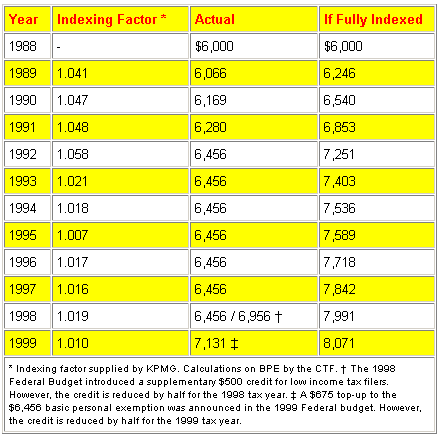
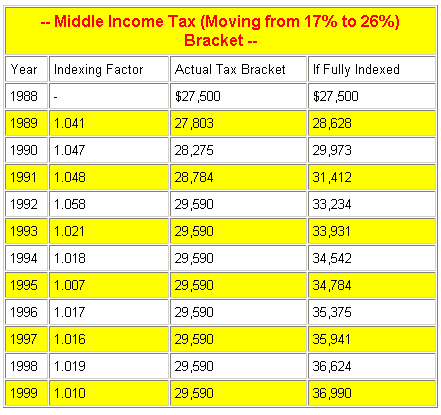
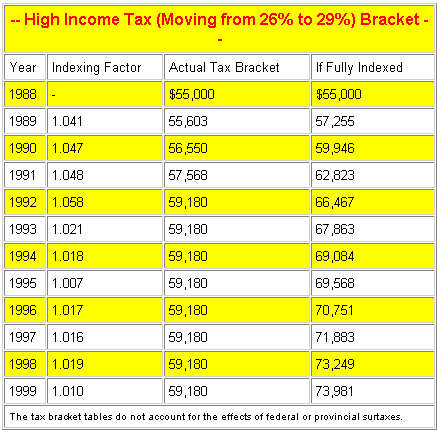
What's the Bottom Line Again
The federal government will net $10.1 billion in personal income taxes in 1999 owing to the impact of partial indexation on the income tax system. The 1999 bracket creep tax take is slightly less than last year's 10.4 billion income tax grab. The net revenue gain for provincial governments will be over $2.5 billion in 1999, owing to the impact of partial indexation - down $100 million over 1998.
The table below demonstrates the impact of partial indexation from 1985 to 1999 on federal and provincial taxes. All things being equal, governments would not have netted this revenue had a policy of full indexation prevailed over this same period.
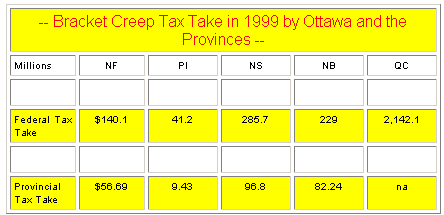
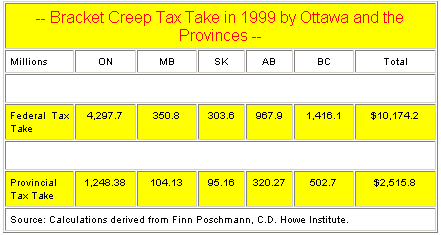
Ottawa's Tax Record
Personal Income Tax Revenues (PIT)
The federal government's reliance on personal income tax revenues continues to increase. Canadians languish under the highest personal income tax burden in the G-7.
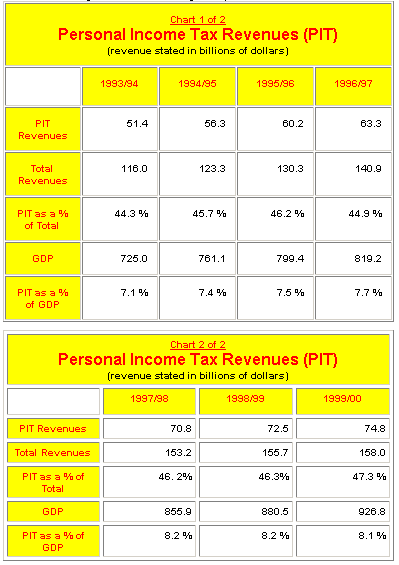
Tax Fact:
The portion of the federal government's revenues derived from PIT revenues has increased by 6.77% over the last seven years.
Tax Fact:
The Personal Income Tax (PIT) burden as a percentage of GDP has increased by 14.1% over the last seven years.
The Tax Take Picture
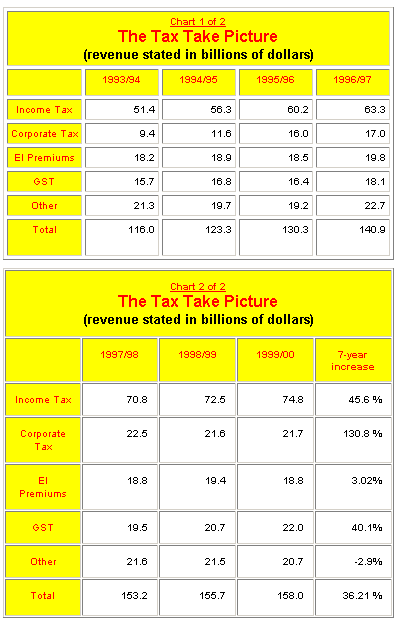
-- A Tax Cut for All Canadians --
Recommended Measures: $8.91 billion
With the federal surplus (more appropriately referred to as the measure of over-taxation) expected to top $10 billion or even $12 billion for 1999/2000, substantive tax relief for Canada's 15 million taxpayers is not only possible, but long overdue. Moreover, billions of dollars in waste and mismanagement still permeate the $112 billion annual federal spending envelope.
CTF Recommendation #1
That the federal government fully re-indexes the tax system to inflation commencing in the year 2000. This measure would help all taxpayers but most substantially benefit low and middle-income earners who have seen their inflation-driven incomes exposed to more taxes, sooner. This would put an end to bracket creep.
Fiscal impact: According to the Department of Finance, $900 million would remain in taxpayers' pockets for each 1.5 percentage points of inflation. If inflation runs at 2.0% in the year 2000, the impact is $1.2 billion.
CTF Recommendation #2
That the federal government fully eliminates the 5% federal surtax on income tax payable commencing in the year 2000. This surtax was introduced in 1986 as a 'temporary deficit reduction surtax.' With the deficit eliminated, the 5% surtax represents nothing more than a greedy tax grab by the federal government.
Fiscal impact: According to the Department of Finance, each percent point reduction in the 5% surtax has an impact of $130 million. The full impact of eliminating the 5% surtax results in $650 million left in taxpayers' pockets.
CTF Recommendation #3
That the federal government cut income taxes across-the-board by 10% commencing in the year 2000. To achieve this cut, the current federal tax brackets of 17%, 26% and 29% would be lowered to 15%, 24% and 27%.
Fiscal impact: According to the Department of Finance, each percentage point cut in all three brackets has an impact of $3.53 billion. A 10% income tax cut results in $7.06 billion left in taxpayers' pockets.